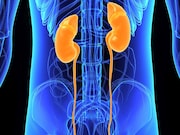Incident CKD accompanied by decreases in kidney damage biomarkers in setting of intensive treatment
TUESDAY, Oct. 23, 2018 (HealthDay News) — Patients with incident chronic kidney disease (CKD) in the setting of intensive systolic blood pressure (SBP) treatment have decreases rather than increases in kidney damage biomarkers, according to a study published online Oct. 23 in the Annals of Internal Medicine.
William R. Zhang, from the University of California in San Francisco, and colleagues compared changes in kidney damage biomarkers between 162 incident CKD case participants and 162 matched controls and between case participants in the intensive (<120 mm Hg; 128 participants) versus the standard (<140 mm Hg; 34 participants) SBP management groups of the Systolic Blood Pressure Intervention Trial (SPRINT).
The researchers found that the odds of incident CKD increased with higher concentrations of urinary albumin, kidney injury molecule-1, and monocyte chemoattractant protein-1 at baseline (adjusted odds ratio per doubling: 1.50, 1.51, and 1.70, respectively). Greater decreases in albumin-creatinine ratio (ACR), interleukin-18, anti-chitinase-3-like protein 1 (YKL-40), and uromodulin were seen in incident CKD participants in the intensive group versus matched control participants after one year of blood pressure intervention. Decreases in ACR, β2-microglobulin, α1-microglobulin, YKL-40, and uromodulin were greater in the intensive group versus case participants in the standard group.
“These findings suggest that eGFR reductions observed in the setting of intensive blood pressure lowering are mostly hemodynamic in nature, even among persons who may be inappropriately labeled as having a new diagnosis of CKD,” the authors write. “These findings, in conjunction with the lower cardiovascular disease and mortality risk reported in SPRINT, should reassure clinicians who embark on evidence-based intensive blood pressure lowering for their patients.”
Two authors disclosed financial ties to the biopharmaceutical and health care industries.
Copyright © 2018 HealthDay. All rights reserved.








